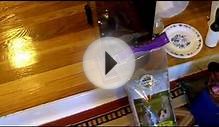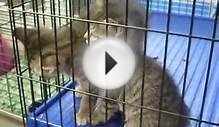
Find Pet stores in my area
Here are the answers to some frequently asked questions about puppy mills.
What is a puppy mill?
A puppy mill is an inhumane, commercial dog-breeding facility in which the health of the dogs is disregarded in order to maintain a low overhead and maximize profits.
What is The HSUS doing about puppy mills?
The HSUS takes a stand against puppy mills on all possible levels, including supporting legislative changes, conducting investigations and litigation, and promoting public awareness and education. The HSUS also works with local authorities when called upon to help shut down the most abusive puppy mills.
It's important to know that, in many cases, puppy mills are not illegal. In most states, a breeding kennel can legally keep dozens, even hundreds, of dogs in cages for their entire lives, as long as the dogs are given the basics of food, water, and shelter. When documented cruelty exists, The HSUS assists in shutting down puppy mills with the cooperation of local law enforcement. The HSUS has assisted in the rescue of almost 5, 000 dogs from puppy mills over the past two years alone. But while The HSUS is opposed to puppy mills, The HSUS cannot shut down or raid legal businesses. The HSUS is not a government, law enforcement, or regulatory agency.
Because most puppy mills are not illegal, we need help from the public to put an end to the consumer demand for their "product." You can help The HSUS put a stop to puppy mills by getting your next dog from an animal shelter, rescue group, or a humane and responsible breeder that you have carefully screened in person.
Read more about adopting or buying a puppy.
Are there any laws that regulate puppy mills?
In 1966 Congress passed the Animal Welfare Act, which outlines specific minimum standards of care for dogs, cats, and some other kinds of animals bred for commercial resale.
The AWA is enforced by the United States Department of Agriculture. Under the AWA, certain large-scale commercial breeders are required to be licensed and regularly inspected by the USDA. But there are many inefficiencies and loopholes in the system.
Only large-scale commercial facilities that breed or broker animals for resale—to pet stores for example—or sell puppies sight-unseen, such as over the Internet, are required to be licensed and inspected by the USDA because they are considered "wholesale" operations. Those that sell directly to the public face-to-face—thousands of facilities that breed and sell just as many puppies as their wholesale counterparts—are not required to adhere to the Animal Welfare Act or to any federal humane care standards.
Inspection records obtained by The HSUS show that many USDA-licensed breeders get away with repeated violations of the Animal Welfare Act. These violators are rarely fined and their licenses are rarely suspended. Facilities with long histories of repeated violations for basic care conditions are often allowed to renew their licenses again and again.
For decades, The HSUS has been a leader in promoting legislative and regulatory changes that would address all large-scale breeding facilities. We also continue to encourage better staffing and funding for USDA inspection programs, which would increase enforcement capabilities.
There is a puppy mill in my area. How can I get the authorities to investigate and it shut down?
First, please be aware that operating a commercial breeding kennel may not be illegal in your area. But if you have seen specific evidence of cruelty or neglect, the first agency to contact is a local agency with law enforcement powers, such as the local humane society, animal control agency or police or sheriff's department.
Cruelty or neglect laws vary by state but typically address conditions such as animals without food and water, sick dogs who are not being medically treated, or dogs without adequate shelter from the elements. Prepare specific details of your complaint in advance, and after you have made a report get a case number or contact information related to your case. If you do not hear back from the local authorities within a week, please call them back to ask for an update, but be aware that if there is an ongoing investigation some information may not be available to the public. If you can't get local help for the situation or are not sure who to call, please contact The HSUS at stoppuppymills@humanesociety.org.
You may also wish to contact the United States Department of Agriculture Animal Care Division and find out if the USDA licenses the facility owner. Only "wholesale" breeding facilities (those that sell puppies to other businesses who in turn sell the puppies to the public) are required to be USDA licensed—this is a small portion of all the large-scale breeders in the country. Currently licensed breeders and some of their most recent inspection reports are available on the USDA/APHIS website.
RELATED VIDEO



Share this Post
Related posts
Colorful lizard
A very large species of chameleon that is endemic to forests in eastern and northern Madagascar. They reach up to 68 cm (27…
Read MorePet Stores That Sell turtles
If you are looking to buy a pet turtle or pet terrapin you should know the choices that are out there. There are the local…
Read More











